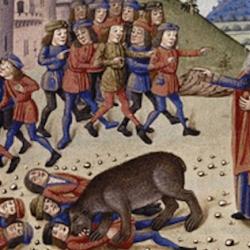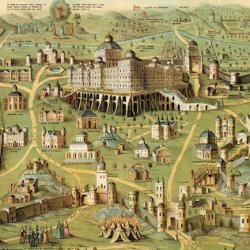INTRODUCTION
As the history of Israel begins to wind to a close, history begins to repeat itself. After the reign of Solomon, the united kingdom divided in two, Jeroboam established a separate kingdom, Rehoboam planned an attack but refrained because of a prophet, and Shishak of Egypt plundered the temple. All that is happening again.
THE TEXT
“In the second year of Joash the son of Jehoahaz, king of Israel, Amaziah the son of Joash, king of Judah, became king. 2 He was twenty-five years old when he became king, and he reigned twenty-nine years in Jerusalem. His mother’s name was Jehoaddan of Jerusalem . . . .” (2 Kings 14:1-29).
RETURN TO THE FUTURE
Amaziah is a new Rehoboam. Like Solomon’s son, Amaziah goes to fight the north and a prophet intervenes; unlike Rehoboam, Amaziah refuses to hear the prophet and is defeated by the Northern king Jehoash. In retaliation, Jehoash plunders the temple and breaks down the walls of the city of Jerusalem, as Shishak did (vv. 13-14). There is even another Jeroboam in Israel by the end of the chapter.
AMAZIAH
Generally, Amaziah was a good king, but he is good as Joash was good and not as David was good (v. 3). That comparison with Joash not only points to his failure in connection with high places (v. 4; cf. 2 Kings 12:3), but also to the undignified end of his reign (vv. 17-22). He is like David in one respect: He fought and defeated Edomites and Arameans (cf. 2 Samuel 8:13-14). But Amaziah, unlike David, is puffed up by his victory and acts foolishly by challenging Israel to fight. Ahaziah does “right” (v. 3), while Jehoash does “evil” (13:11), yet when the two face each other in battle the “evil” one defeats the “righteous.” Not only that, but Jehoash – the wicked king – responds to Amaziah with a wisdom parable similar to the parable of Jotham in Judges 9. Jehoash knows that those who are exalt themselves are debased (v. 10).
“Let’s face each other” (v. 8) can be a challenge to battle, or an invitation to a conference. In either case, it’s includes an implicit claim to equality. Only equals stand face to face; subordinates always keep their faces low before a king. Jehoash’s parable compares himself and his kingdom to the mighty, immovable cedar, while Amaziah is a useless, dangerous, cursed (Genesis 3) thorn bush. Amaziah can no more “face” Jehoash than a thorn bush a cedar. This battle will determine which king’s dynasty will head a reunited kingdom. Amaziah is making a Rehoboam-like bid to reunite the kingdom by force.
JUDAH’S FIRST EXILE
Amaziah and Jehoash do “face” each other (v. 11), but this leads to a “loss of face” for Amaziah. He is captured by Jehoash, as Judah will later be captured by Babylon, and Jehoash continues to the capital to do in part what Nebuchadnezzar will later do more fully. This first “exile” of Judah is carried out by Israel. Verses 15-16 seem out of place. Jehoash’s death is recounted twice (13:13; 14:15-16), and the second death notice is placed so that it seems to close out the reign of Amaziah rather than Jehoash (cf. 14:1-2). Amaziah never returns from his “exile,” in spite of the fact that he lived for fifteen years after Jehoash died (v. 17) and though he is in Jerusalem at his death (v. 19). The kingdom is reunited as Amaziah hoped, but under Jehoash. The time of Judah is marked by the time of Jehoash.
THE REUNITED KINGDOM
The idea that the kingdom is reunited under Jehu’s dynasty is supported by several details in the reign of Jeroboam II. Verse 25 tells us that the borders of Israel extended from Hamath in the North to the Sea of the Arabah in the south, and the latter boundary is well into Judah’s territory. Besides, these are the ideal boundaries of the original united kingdom (cf. 1 Kings 8:65). Verse 28 is difficult, but it appears to mean that Jeroboam recovered territory for Judah, which is not considered a subdivision of Israel (“in Israel”). It is a neat irony that the second Jeroboam preside over a (semi-) united kingdom.










